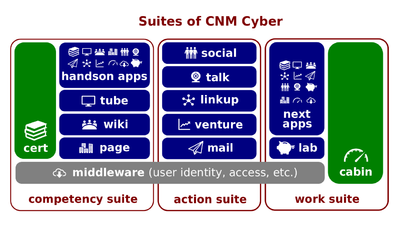Structure of CNM Cloud
Structure of CNM Cloud (hereinafter, the Lectio) is the lesson part of the CNM Cloud Essentials lesson that introduces its participants to Opplet. This lesson belongs to the Introduction to CNM Cloud session of EmployableU Concepts.
Content
The predecessor lectio is CNM Cloud Deployment.
Script
- Opplet is designed with the service-oriented architecture (SOA) concept in mind. Its software systems are discrete and are able to operate independently. To work together, they feature clear and simple interfaces, so communication protocols can be used to orchestrate the systems when needed.
- CNM Farms, WorldOpp Middleware, and CNM apps form the structure of Opplet.
- CNM apps are the most visible area of Opplet; they are those end-user applications that you communicate with directly. However, these apps require their environment and orchestration.
- CNM Farms are the basis of this environment; the Farms provide functionality for both the apps and the Middleware. The environment includes its operating systems, web servers, database management systems, and support for programming languages.
- WorldOpp Middleware is used for system orchestration. In information technology, that orchestration refers to the automated configuration, coordination, and management of software systems.
- The Middleware provides CNM apps with those services that are central for the Cloud and cannot be provided by the Farms. Particularly, the Middleware handles user permissions and rights throughout the whole Cloud.
Key terms
Closing
Select True/False:
- The software systems of Opplet are able to operate independently--- T/F.
Available vs Custom Code is the successor lectio.
